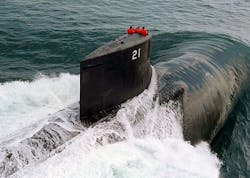Navy asks L-3 Chesapeake Sciences to build additional TB-34X submarine towed array sonar systems
WASHINGTON – Submarine sonar experts at L-3 Chesapeake Sciences Corp. in Millersville, Md., will build additional TB-34X towed array sonar systems for U.S. Navy submarines under terms of a $13.8 million order announced on Tuesday.
Officials of the Naval Sea Systems Command in Washington are asking L-3 to provide TB-34X towed array assemblies, cable assemblies, test sets, and engineering services.
The TB-34X is a submarine fat line towed array passive sonar receiver It is in the same form factor as the TB-34 array, yet it provides increased capability, reliability, and ability to resist the effects of obsolescence.
The Navy's TB-34 towed array is replacing the TB-16 legacy array, and provides enhancements to towing and self-noise characteristics compared to the TB-16. It provides more hydrophones than the TB-16 for future capability in passive sonar processing.
The TB-34 towed array is one of several acoustic sensors that provide data to the Acoustics-Rapid Commercial Off-the-Shelf Insertion (A-RCI) sonar system installed on U.S. fast-attack, ballistic missile, and cruise missile submarines.
The array is to provide improved capability for anti-submarine warfare (ASW), and will help submarine crews avoid threats in cluttered undersea areas near coastal waters and harbors.
The TB-34 towed array's primary function is to help search for, detect, track, and attack enemy submarines and surface vessels in coastal waters and in the open ocean.
On this order L-3 Chesapeake Sciences will do the work in Millersville, Md.; Liverpool, N.Y.; and Ashaway, R.I., and should be finished by December 2022.
For more information contact L-3 Chesapeake Sciences online at www.l-3mps.com/divisions/csc.aspx, or Naval Sea Systems Command at www.navsea.navy.mil.
Ready to make a purchase? Search the Military & Aerospace Electronics Buyer's Guide for companies, new products, press releases, and videos

